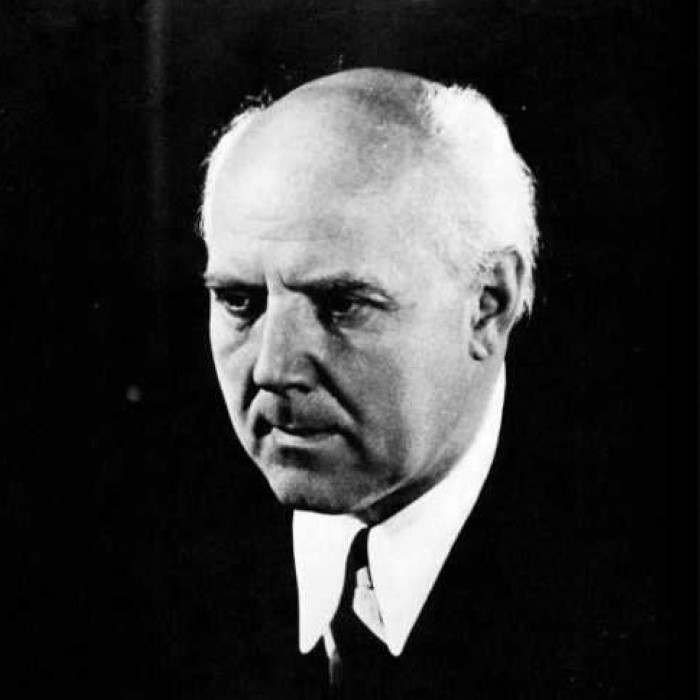Members
1 Male
Origin
 Lyon, French
Lyon, French
Genre
 Pianist
Pianist
Style
Classical
Mood
---
Born
1 Male
Origin
Genre
Style
Classical
Mood
---
Born
1895
Active ---
![]() 1956
1956
Cutout![]()
No loved tracks found...
Artist Biography
Available in:
Walter Wilhelm Gieseking (5 November 1895 – 26 October 1956) was a French-born German pianist and composer.
Born in Lyon, France, the son of a German doctor and lepidopterist, Gieseking first started playing the piano at the age of four, but without formal instruction. His family travelled frequently and he was privately educated.
From 1911 to early 1916, he studied at the Hanover Conservatory. There his mentor was the director Karl Leimer, with whom he later co-authored a piano method. He made his first appearance as a concert pianist in 1915, but was conscripted in 1916 and spent the remainder of World War I as a regimental bandsman. His first London piano recital took place in 1923, establishing an exceptional and lasting reputation.
During World War II Gieseking continued to reside in Germany, while continuing to concertize in Europe, and was accused of having collaborated with the Nazi Party. He was criticized for this by pianists Vladimir Horowitz, who, in the book Evenings with Horowitz, calls Gieseking a "supporter of the Nazi," and by Arthur Rubinstein who recounted in his book My Many Years a conversation with Gieseking in which alleges he said "I am a committed Nazi. Hitler is saving our country." Gieseking performed in front of Nazi cultural organizations such as the NS Kulturegemeinde and "expressed a desire to play for the Führer". Along with a number of other German artists, Gieseking was blacklisted during the initial postwar period. By January 1947, however, he had been cleared by the U.S. military government, enabling him to resume his career although his U.S. tour scheduled for January 1949 was cancelled owing to protests by organizations such as the Jewish Anti-Defamation League and the American Veterans Committee. Although there had been other protests (in Australia and Peru, for example), his 1949 American tour was the only group of concerts actually cancelled due to the outcry. He continued to play in many other countries, and in 1953 he finally returned to the United States. His concert in Carnegie Hall was sold out and well received, and he was more popular than ever.
Because of his gifts of a natural technique, perfect pitch, and abnormally acute faculty for memorization, Gieseking was able to master unfamiliar repertoire with relatively little practice. From his early instruction in the Leimer method, he usually studied new pieces away from the piano. It became well-known to the public, for instance, that he often committed new works to memory while traveling by train, ship or plane. Sometimes, according to Harold C. Schonberg's book The Great Pianists (1963), he could even learn an entire concerto by heart in one day.
Gieseking had a very wide repertoire, ranging from various pieces by Bach and the core works by Beethoven to the concertos of Rachmaninoff and more modern works by composers such as Busoni, Hindemith, Schoenberg and the lesser-known Italian Petrassi. He gave the premiere of Pfitzner's Piano Concerto in 1923. Today, though, he is particularly remembered for his recordings of the complete piano works of Wolfgang Amadeus Mozart and the two French impressionist masters Claude Debussy and Maurice Ravel, virtually all of whose solo piano music he recorded on LP for EMI in the early 1950s (the Mozart and Debussy sets have recently been re-released on CD), after recording much of it for Columbia in the 1930s and 1940s, some of which have also been re-released on CD.
Gieseking's 1945 performance of Beethoven's "Emperor" Concerto, in which anti-aircraft fire is audible, is one of the earliest stereo recordings, following a rendition of the same work in 1934 for Columbia, with Bruno Walter conducting the Vienna Philharmonic. In December, 1955, Gieseking suffered head injuries in a bus accident near Stuttgart, Germany, in which his wife was killed.
His last recording project was the complete cycle of Beethoven's Piano Sonatas. Gieseking suddenly fell ill in London, however, while recording Beethoven's "Pastoral" Sonata in D Piano Sonata No. 15 for HMV. He had completed the first three movements and, the following day, was due to record the rondo finale but died a few days later of postoperative complications for the relief of pancreatitis. HMV released the unfinished recording, and since then broadcast recordings of Gieseking playing all of Beethoven's Piano Sonatas (with the exception of Op. 54, which he never recorded) have been issued. Although some of his performances, particularly live, could be marred by wrong notes, Gieseking's best performances, as in studio recording sessions, were virtually flawless.
Parallel to Gieseking's work as a performing artist he was also a composer, but even in his lifetime his compositions were hardly known, and he made no attempt to give them publicity. A few of them have recently been recorded on CD.
Wide Thumb
Clearart
Fanart

Banner
User Comments
 No comments yet..
No comments yet..
